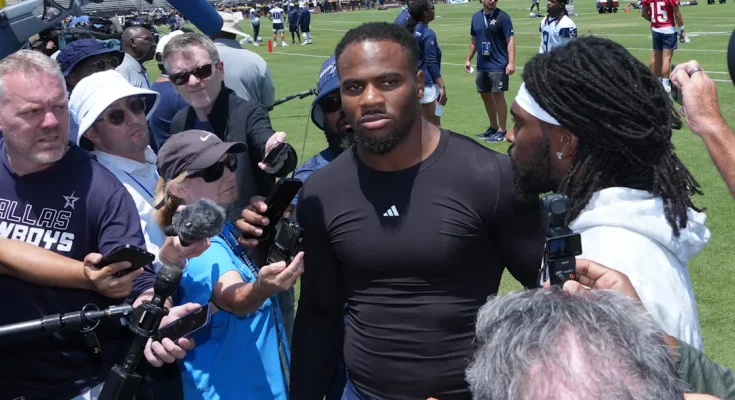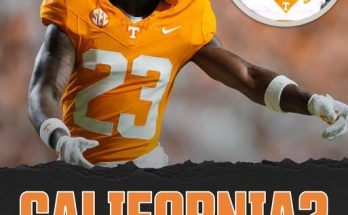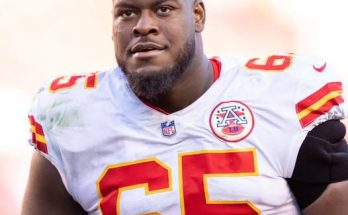Micah Parsons is no stranger to headlines, but this time, it’s not for his dominance on the field. The Dallas Cowboys superstar edge rusher has decided to let the world in on something that’s been brewing quietly behind closed doors—his growing frustration with the ongoing contract saga. In an offseason defined by speculation, contract extensions, and front office maneuvering, Parsons has become the latest big name to make his discontent public. And when a player of his stature speaks up, the entire NFL listens.
Parsons, widely regarded as one of the most dynamic defensive players in the league, has made it clear he’s not pleased with how long negotiations are dragging on. His comments this week reflect a player who is reaching his boiling point, not out of entitlement, but out of a deep desire to be respected and valued by the organization he’s helped become a perennial contender. “I’m tired of the waiting game,” Parsons said in a recent interview. “At some point, it’s not about patience—it’s about principle.” That sentiment has resonated far and wide among NFL players, fans, and analysts alike.
The Cowboys, who have a history of long, drawn-out contract negotiations, are once again in the spotlight for all the wrong reasons. From Dez Bryant to Ezekiel Elliott and Dak Prescott, Dallas has shown a tendency to let things play out longer than necessary. This approach can work with certain players, but in Parsons’ case, it’s a risky gamble. He’s the heart and soul of the defense, a tone-setter whose presence changes the game. Every time he takes the field, he commands double-teams, wreaks havoc in the backfield, and energizes a unit that has ranked among the league’s best during his tenure. Simply put, Parsons is not the type of player you test with passive-aggressive contract strategies.
In the past, Parsons had been diplomatic about his status. He deflected questions, stayed focused on football, and leaned on the hope that “everything will work itself out.” But time has passed, and the clarity he hoped for still hasn’t come. That’s why this public admission marks a shift—not just in tone, but in urgency. Parsons isn’t just playing hardball; he’s calling the Cowboys out in a way that demands attention. And the Cowboys front office, led by Jerry Jones and Stephen Jones, now finds itself walking a dangerous tightrope. Waiting too long risks alienating their biggest defensive star, and potentially sending shockwaves through a locker room that looks to Parsons as one of its key leaders.
The market for top defensive players is red-hot. In recent months, we’ve seen edge rushers like Nick Bosa, T.J. Watt, and Myles Garrett secure massive paydays. Parsons, arguably as impactful—if not more—has every right to expect a deal that resets the market or at least places him firmly among the top earners. He’s not just a pass rusher; he’s a chess piece. Defensive coordinator Dan Quinn used him in multiple roles, from linebacker to defensive end to hybrid blitz specialist, and the results speak for themselves. His versatility, coupled with his elite athleticism, makes him an invaluable asset in today’s NFL, where defenses must constantly adapt to the modern offensive explosion.
Parsons’ rookie deal still has time left, and the Cowboys technically have leverage with the fifth-year option and franchise tag in their pocket. But leverage doesn’t equal loyalty, and that’s the tightrope the front office is wobbling on. Players of Parsons’ caliber don’t grow on trees, and they certainly don’t take kindly to feeling underappreciated. For someone who’s given everything to the franchise—from playing through injuries to mentoring younger players—this standoff feels like a disrespectful pause in what should’ve been a celebratory moment. And for fans who’ve watched the Cowboys inch closer to Super Bowl contention over the last few seasons, the timing couldn’t be worse.
Dallas is entering a critical phase. With key players on both sides of the ball, including CeeDee Lamb and Dak Prescott, also needing long-term commitments, the clock is ticking. But among them, Parsons is arguably the most irreplaceable. You don’t just replace his motor, his speed, or his football IQ. And you certainly don’t replace the psychological edge he brings—when opposing quarterbacks step onto the field, they know where Parsons is at all times. That’s rare. That’s what makes him elite. That’s what makes this situation so pressing.
Parsons’ remarks also underscore a larger theme that’s becoming more prevalent across the league—players want transparency. They want communication. They want front offices to treat them like the professionals they are. For too long, organizations have operated in a cloud of ambiguity, keeping negotiations behind closed doors and offering vague public statements. But today’s players are brand-aware, media-savvy, and unafraid to control their narratives. Parsons speaking out isn’t just about frustration—it’s about accountability. He’s letting fans and teammates know where he stands, and he’s holding the Cowboys accountable in the most public way possible.
Reactions across the NFL world have been swift. Former players have weighed in, some supporting Parsons’ decision to speak out, others warning that going public can backfire. Yet most agree on one point: Micah Parsons is too good to be put in limbo. ESPN analyst Marcus Spears, himself a former Cowboy, put it bluntly: “You don’t play games with a player like that. Pay him. Yesterday.” That sentiment is being echoed by media outlets, insiders, and even rival players who understand that star defenders like Parsons are rare commodities.
If there’s one silver lining, it’s that the Cowboys still have time to right the ship. Negotiations aren’t dead, and if Parsons’ comments serve as a wake-up call, then perhaps this moment becomes a turning point. But if the front office continues to delay, they risk something far more costly than just a few extra million dollars—they risk damaging a relationship that has fueled their rise. A fractured bond between team and superstar can’t always be repaired with a check. Respect, once lost, doesn’t regenerate overnight.
For now, the focus turns to training camp and preseason. Parsons has reported and is participating, but his tone is different. He’s not shy about how he feels, and he’s not afraid to make things uncomfortable if that’s what it takes to spark movement. For the Cowboys, this is a test of priorities. Are they willing to invest in the player who embodies their defensive identity? Or are they willing to let another potential crisis unfold, just as the regular season looms?
In an NFL era defined by player empowerment and financial savvy, teams must evolve or risk falling behind. The Cowboys have built something special with Micah Parsons, and letting it unravel over contract posturing would be a monumental mistake. He’s more than just a player—he’s a culture setter, a competitor, and a face of the franchise. Treating him as anything less sends a dangerous message to the rest of the locker room and the league at large.
Micah Parsons’ frustration may have burst into the public eye this week, but it’s been simmering beneath the surface for a while. Now, it’s up to the Cowboys to decide how they respond. Will they act decisively, reward their star, and recommit to the path they’ve been building? Or will they allow this situation to spiral, creating distractions and divisions that could derail a promising season? The ball, as always, is in Jerry Jones’ court. But this time, the spotlight is brighter, and the stakes are higher. Micah Parsons has spoken—loud and clear.



